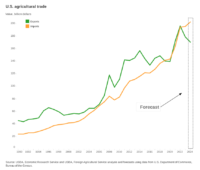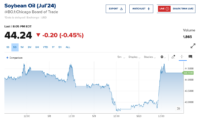Bloomberg's Clarice Couto reported this past Friday that "a surprising tax change in agriculture powerhouse Brazil has the potential to make soy grown in the world’s largest bean exporter less…
Ukrainian Drones Attack Russian Black Sea Grain Export Port of Novorossiysk, as U.S. Grain Export Inspections Fall in Second Quarter
Bloomberg writer Ben Sharples reported today that, “Wheat futures rose after the Novorossiysk port was closed to marine traffic by Russian authorities following a drone attack.

“Prices climbed as much as 2.6% in Asian trading, trimming a weekly loss. The Caspian Pipeline Consortium announced the halt, adding oil loadings on moored tankers are continuing and there had been no damage to CPC infrastructure. The port is also utilized for grain, fertilizer and coal.
“Russia’s defense ministry reported an attempted attack on the Novorossiysk naval base overnight by two naval drones, both of which were destroyed.”
Reuters writers Naveen Thukral and Michael Hogan reported today that,
Chicago wheat rose over 3% on Friday after Ukrainian drone attacks near the Russian Black Sea grain export port of Novorossiysk triggered concerns about potential disruption to global grain supplies.
The article indicated that, “‘Novorossiysk is a big sea port for grain shipments and attacks could disrupt grain shipments,’ said Ole Houe, director of advisory services at Australian agricultural brokerage IKON Commodities. ‘The risk to supplies is very real.’
“A European trader added: ‘The massive Russian grain exports from Novorossiysk have been running under pretty much peacetime conditions. There is concern that Ukraine has shown it has the capability to attack Novorossiysk if it wants to retaliate for Russian attacks on its own ports.'”
A separate Reuters News article from today reported that, “A Russian warship was seriously damaged in an overnight Ukrainian naval drone attack on Russia’s Black Sea navy base at Novorossiysk, two sources said on Friday, after Russia said it had fended off the attack.
“The civilian port, which handles 2% of the world’s oil supply and also exports grain, temporarily halted all ship movement before resuming normal operations, according to the Caspian Pipeline Consortium which operates an oil terminal there.”
The article pointed out that, “Tensions in and near the Black Sea have escalated since Russia last month withdrew from a deal allowing the safe export of grain from Ukrainian ports. Russian drones and missiles have since repeatedly struck Ukrainian port facilities and grain silos on or near the Black Sea.
“Russia has also reported an uptick in attempted Ukrainian naval drone attacks on its own warships in the Black Sea.”
And Financial Times writers Roman Olearchyk, Christopher Miller and David Sheppard reported today that, “The attack follows a series of Russian strikes on Ukraine’s grain export infrastructure in recent weeks, raising the spectre of escalating reprisals as the countries target each other’s main sources of export income.”
A report at The New York Times Online this morning indicated that, “Ukraine used air and sea drones to mount assaults early Friday on two Russian-controlled ports in the Black Sea, including a key naval and shipping hub, Russian officials said, in an apparent expansion of Ukraine’s campaign to strike targets of strategic and symbolic importance to Moscow far from the front lines of the war.
“The attacks came as Russia has bombarded Ukrainian ports along the Black Sea and Danube River, imperiling Kyiv’s grain exports and threatening global food security, and were another sign of Ukraine’s ability to deploy its growing drone arsenal to pierce even well defended Russian targets.
“Russian officials said that the port of Novorossiysk, in southwestern Russia, and a port on the occupied Crimean Peninsula were targeted in the latest strikes.”
Meanwhile, a Reuters article from yesterday reported that, “Romania expects around 30 ships from Ukraine to clear customs on the Danube River over the next two days as it bids to clear a logjam in the aftermath of Wednesday’s Russian attack on Ukraine’s main river port at Izmail.
“The river and its mouth, now Ukraine’s last waterborne grain export route, are backed up with vessels travelling to and from Ukrainian ports, commercial ship tracking data shows.”
Also yesterday, Reuters writer Michelle Nichols reported that, “U.S. Secretary of State Antony Blinken urged all countries at the United Nations on Thursday to tell Russia to stop using the Black Sea as blackmail after Moscow quit a deal that had allowed Ukraine to safely ship its grain to global markets.
Blinken tells Russia at the U.N. Security Council: “Enough using the Black Sea as blackmail.” pic.twitter.com/CIGawRwukK
— Will Mauldin (@willmauldin) August 3, 2023
“‘Every member of the United Nations should tell Moscow ‘enough’,’ said Blinken as he chaired a U.N. Security Council meeting on famine and food insecurity caused by conflict.”
As I said to the @UN Security Council, hunger and conflict are inextricably linked. We must stop the weaponization of hunger, beginning with Russia’s war of aggression against Ukraine and its assault on the global food system. Failure to act now will have dire consequences. pic.twitter.com/7P2DZVUzIL
— Secretary Antony Blinken (@SecBlinken) August 3, 2023
Elsewhere, Dow Jones writer Kirk Maltais reported yesterday that, “Inspections of grain shipments coming from U.S. ports in the second quarter of the year are 26% behind the pace of shipments for the same timeframe last year, said the USDA. The agency notes that grain shipments in most regions were roughly off by 20% to 25%, but those coming out of the Atlantic Coast and Great Lakes were actually 73% behind.
For second quarter 2023, inspections of #wheat, #corn, & #soybeans for export from all major US ports totaled 21.8 mmt.
— FarmPolicy (@FarmPolicy) August 3, 2023
The amount of grain inspected was down 28% from the 5-year avg & down 26% from 2nd quarter 2022 (year to year) https://t.co/LtNqqHsEo0 pic.twitter.com/YSU7jTdpU8
“Soybean inspections were down 47% in the second quarter versus the same timeframe last year, while corn was off 21% and wheat was down 7%.
Second-quarter grain inspections by grain type (#corn🌽, #soybeans🌱, and #wheat 🌾)https://t.co/LtNqqHsEo0 pic.twitter.com/eLwfV0QV1g
— FarmPolicy (@FarmPolicy) August 3, 2023
“Weak export demand is an ongoing narrative in the grain futures market.”







